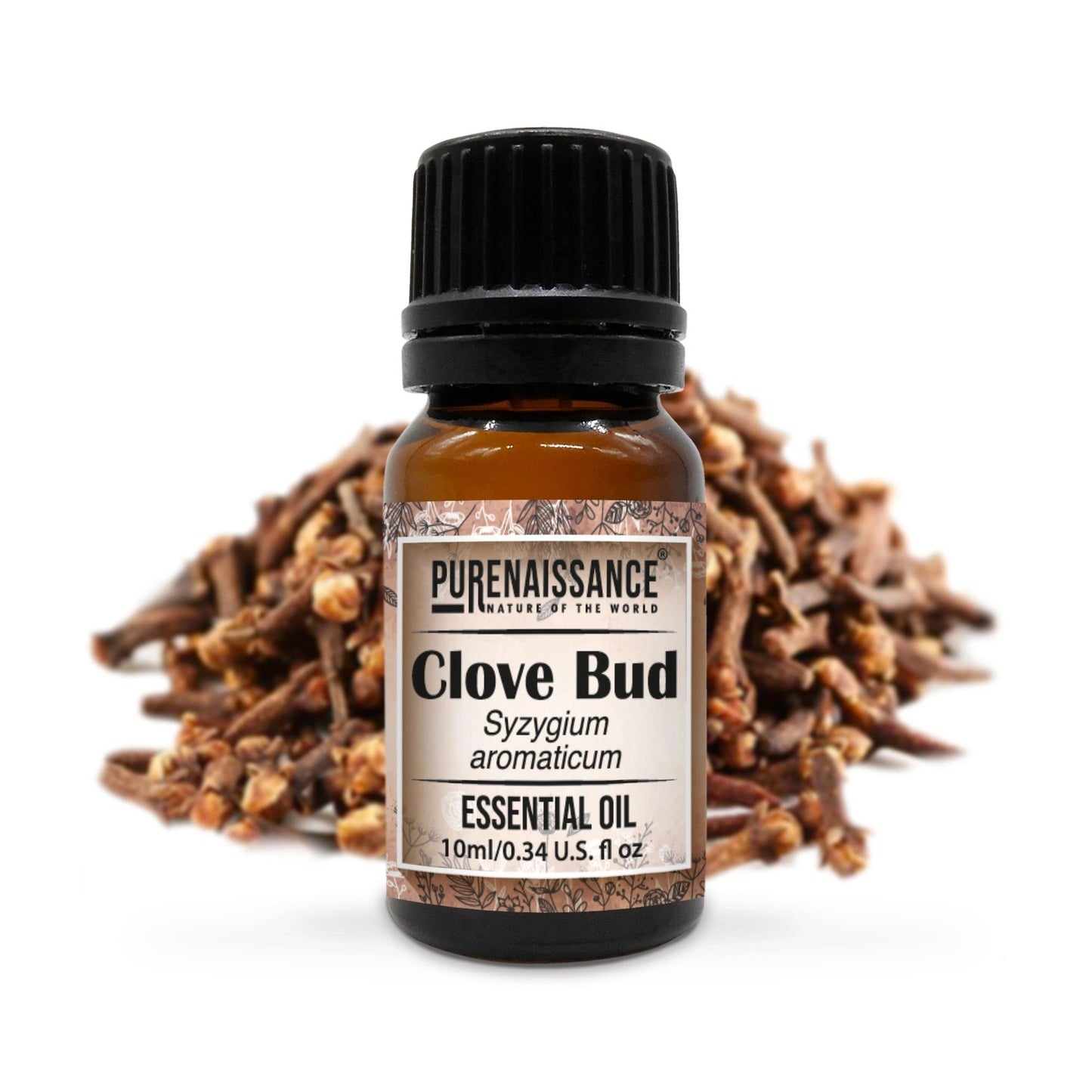Purenaissance
Clove Bud Essential Oil/10 ml
Clove Bud Essential Oil/10 ml
Couldn't load pickup availability
What Is Clove Bud Oil?
Clove Bud essential oil is primarily known for its antiseptic and pain-relieving properties, especially in dentistry. Traditionally and currently, it is used to relieve oral pain caused by abscesses, gingivitis, mouth ulcers, toothaches, or cavities. Its characteristic smell and taste are due to eugenol, reminiscent of products used in dentistry and mouthwashes. Beyond its remarkable analgesic and antimicrobial properties, it is also used in other fields, such as repelling insects and reducing fatigue in sports.
Due to its potent anesthetic nature, clove oil must be diluted for both oral and skin applications. Prolonged oral use may require a hepatoprotective essential oil as a precaution.
Technical Data
- Common Name: Clove, Clove Bud
- Latin Name: Syzygium aromaticum (formerly Eugenia caryophyllata, Caryophyllus aromaticus)
- Appearance: Viscous liquid
- Color: Pale yellow
- Odor: Spicy, warming, slightly bitter, woody
- Botanical Family: Myrtaceae
- Part Used: Flower buds
- Processing Method: Steam distillation
- Type: 100% pure
- Origin: USA
- Preferred Uses: Dermal, Diffusion
Chemical Composition
- Main Compound: Phenols (Eugenol: 70–85%)
- Other Compounds: Esters (eugenyl benzoate: 15–20%), Sesquiterpenes (Caryophyllene: 5–15%), with traces of monoterpenes, monoterpenols, oxides, ketones, sesquiterpenols, and aldehydes.
Physical Characteristics
- Density at 20 °C: 1.042–1.065
- Refractive Index at 20 °C: 1.528–1.538
- Rotatory Power at 20 °C: -2° to +0°
- Flash Point: 93 °C
- Water Solubility: Insoluble
- Shelf Life: 4–5 years (approx.)
-
Storage Conditions:
- Avoid contact with eyes and mucous membranes.
- Keep in a cool, dry place, away from humidity.
- Always store in containers made of the same material as the original packaging.
Properties of Clove Bud Oil
Clove essential oil owes its benefits to the active compounds found in the flower buds of Syzygium aromaticum.
For Health
- Painkiller: Eugenol provides potent analgesic properties with a rubefacient effect for pain relief.
- Antimicrobial: Anti-fungal, antiviral, antibacterial, and antiparasitic properties.
- Digestive Aid: Antispasmodic and aids in alleviating bloating, gas, and intestinal discomfort.
-
Other Properties:
- Anticoagulant
- General tonic (neurotonic, endocrine, and uterine)
- Immune stimulant
For Well-Being
- Nervous system tonic
- General stimulant
- Sexual tonic
Indications for Use
For Health
- Immune Deficiencies: Enhances immune response during convalescence, fatigue, infections, or epidemics.
- Digestive Disorders: Helps with bloating, gas, diarrhea, and intestinal infections.
- Pain Relief: Useful for muscle pain, arthritis, migraines, and dental pain.
- ENT Disorders: Assists with colds, bronchitis, and sinus infections.
For Well-Being
- Boosts energy and reduces exhaustion.
- Addresses anxiety, depression, and low libido.
Usage Guidelines
-
Topical Application:
- Dilute 1 drop of clove oil in 5 drops of a carrier oil (e.g., coconut or almond oil). Apply to affected areas.
- For dental pain, apply directly using a cotton swab.
-
Oral Use:
- Must be diluted in oil, cream, or honey and used under professional guidance.
-
Diffusion:
- Use at a low concentration (5–10%) in a blend with gentler oils like lavender or sweet orange.
Precautions
- Not suitable for pregnant or breastfeeding women, or children under 12 years.
- Avoid undiluted use on the skin due to its dermocaustic nature.
- Do not use in baths or for inhalation.
- Hepatotoxic in high doses.
- May cause nausea, vomiting, or rashes if improperly used.
Note: Always consult a healthcare professional or certified aromatherapist before using clove bud oil for any medical or therapeutic purpose.
Share


